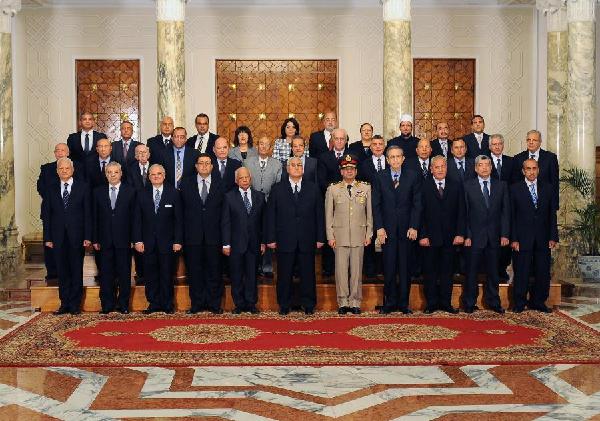Egypt's interim gov't sworn in
 0 Comment(s)
0 Comment(s) Print
Print E-mail China.org.cn, July 17, 2013
E-mail China.org.cn, July 17, 2013
Egypt's interim government, headed by Prime Minister Hazem Beblawi, was sworn in on Tuesday, hours after violent clashes between police and Morsi supporters left 7 protesters dead and 261 others injured.
|
|
|
In this hand out picture released by the Egyptian presidency shows Egypt's interim president Adly Mansour (front C) and the newly sworn-in Egypt's interim cabinet pose for a group picture on July 16, 2013 in Cairo. Egypt's interim government, headed by Prime Minister Hazem Beblawi, was sworn in on Tuesday, with no one from Islamic parties included in the interim cabinet. (Xinhua/Egyptian Presidency) |
The 33-minister cabinet included no members from Islamic parties.
Army chief Abdel-Fattah el- Sisi, who ousted President Mohamed Morsi on July 3, retained his post as defense minister and will also serve as the first deputy of Beblawi.
Another two deputies of Beblawi are Ziad Bahaa-Eddin, who will be the minister of international cooperation, and Hossam Eissa, who is appointed to take charge of higher education.
Three Copts assume posts in the cabinet. The cabinet also includes three females: Maha Zein el-Aabdeen, minister of health and population; Laylah Rashid Exander, minister of environment affairs; and Doriah Sharaf el-Din, minister of culture.
The transportation minister is not included in the new lineup.
Also the ministry for planning and international cooperation was separated into two ministries. Ziad Bahaa-Eddin is the minister of international Cooperation, and Ashraf el-Arabi for planning.
New ministry for Transition Justice and Reconciliation headed by Mohamed Mahdi was introduced.
At least five ministers from the former cabinet kept their posts, including tourism, interior, electricity, defense and communication.
The Muslim Brotherhood, from which ousted President Morsi hails, rejected taking part in the new cabinet, saying in a statement "We don't recognize its legitimacy or its authority."
After the new cabinet was sworn in, interim President Adli Mansour convened the first meeting of the cabinet at the presidential palace to mainly discuss issues of economy and security. The meeting was also attended by Vice President for International relations Mohamed ElBradei.
A senior figure in the Muslim Brotherhood said earlier the group "refuses" any talk about national reconciliation called upon by the presidency because it happens under "illegitimate" power.
The Egyptian Presidency said earlier Tuesday that it has started making contacts with different political groups, including the Muslim Brotherhood and other Islamist forces, to discuss national reconciliation, expecting "most Islamist forces" to join the process.
(Xinhua contributed to the story)







Go to Forum >>0 Comment(s)